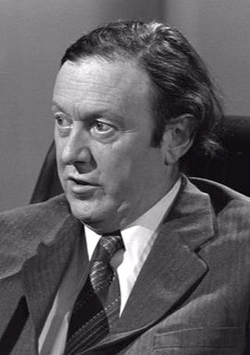Twice in the past two weeks, I found myself disinvited from television shows when I objected to appearing with representatives of radical Islam or the far-left. In both cases, once each with CNN and MSNBC, I agreed to precede or follow these persons, but I refused to debate them, resulting in my exclusion.
I have two reasons for not going on American television with people who hate the United States. (Non-American television – and Al-Jazeera in particular – is a different story.)
The lesser reason is personal: Appearing with Islamist motormouths and leftist attack-dogs is unpleasant. It often means refuting ad-hominem calumnies and having to strike back. Besides the indignity involved, such vituperation can have unfortunate consequences. For example, my 2002 television debate with a far-leftist ended up distorted, at my expense, by an admirer of his in the pages of Newsweek magazine; fortunately, a full transcript of the show is available.
 The "one person" mentioned here. |
Television offers a unique medium for getting one's ideas out to large numbers of people, especially when presented in a lively debate format, so I regret not appearing on screen. I find myself in a dilemma, wishing to accept television invitations but sometimes unable to do so.
This dilemma results from the flawed reasoning of television executives in democracies. My conversations with insiders reveal that they include extremists for three main reasons. First, because good viewer ratings are generated by impassioned, articulate, and known panelists with sharply clashing viewpoints. With this, I have no problem.
Second, today's broadcasts strive toward impartiality. For instance, a memo distributed to Canadian Broadcast Corporation staff cautions against using the words "terrorist" and "terrorism," because these "can leave journalists taking sides in a conflict." The conceit that members of the press have no stake in the outcome of war is terribly wrong; just imagine how television talk shows would be after these same terrorists took over. (They did not flourish under the Taliban, to put it mildly.)
Third – and quite contradictorily – when pressed about the appropriateness of broadcasting the enemy's view, producers assert they are doing a public service by exposing these. Is freedom of speech, they ask, not premised on the open marketplace of ideas? And does that not imply having faith that an informed citizenry will discern the sensible from the wrong-headed?
Yes and no. Freedom of speech means speaking one's mind, without fear of going to jail. It does not imply the privilege to address a television audience.
 Conor Cruise O'Brien. |
Is this wise public policy?
The distinguished historian Conor Cruise O'Brien thinks not. When he served as the Irish minister of posts and telecommunications in 1976, he imposed a ban on interviews with Irish Republican Army terrorists and Sinn Fein members, arguing that it was necessary to prevent them from spreading their message. For the same reason, the Russian foreign ministry expressed its "strong indignation" after America's ABC television last week interviewed Chechen terrorist leader Shamil Basayev.
The ideal solution lies not in creating censors' bureaus to pass judgment on television content but for media executives to accept their responsibilities in time of war. On their own initiative, they should exclude the enemy's apologists and advocates. Lively debate does not require such people; patriots with sharply differing views can also make sparks fly.